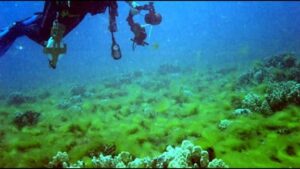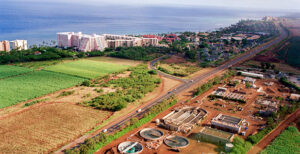A recent U.S. Supreme Court (SCOTUS) ruling found that pollution discharge into groundwater from a Maui County (HI) sewage treatment plant (County of Maui v. Hawaii Wildlife Fund) fueled macroalgal (seaweed) blooms along the west side of the Island of Maui. This case is based on research funded by the NCCOS Competitive Research Program (CRP) beginning almost 30 years ago.

Seaweed-covered coral reefs off coastal Maui. Credit: Hawaii News Now.
The issue before the Supreme Court was whether the Clean Water Act's permitting program applies to pollution that funnels through groundwater before reaching a federally regulated waterway. On the island of Maui, wastewater injected into disposal wells travels underground and ends up in the Pacific Ocean.
Following a series of studies funded by the NOAA Coastal Ocean Program (now NCCOS CRP) in the 1990’s, NCCOS CRP initiated a research study on Maui’s macroalgal blooms in 2002 led by the University of Hawaii at Manoa. This project, “Nuisance Macroalgal Blooms in Coastal Maui: Assessment and Integration of Physical Factors and Biological Processes,” was funded through the Ecology and Oceanography of Harmful Algal Blooms (ECOHAB) program and included partners from the Waikiki Aquarium, Hawaii Department of Health, Hawaii Division of Aquatic Resources, and U.S. Geological Survey (USGS). The project linked the substantial nuisance macroalgal blooms in Maui coastal waters with wastewater nutrient sources. These results were followed by a tracer study that connected wastewater injection into groundwater at Lahaina wastewater treatment plant, which was identified in the lawsuit, with impacted coastal waters. The ECOHAB project culminated in a December 2008 workshop sponsored by CRP. Concurrent with the ECOHAB study, the CRP-supported Hawaii Coral Reef Initiative (HCRI) funded the University of Hawaii Manoa for additional related studies.

Maui County, Hawaii, wastewater treatment facilities at issue in Supreme Court litigation. Credit: Warren Gretz/NREL via E&E News
The ECOHAB and HCRI projects focused research efforts on the link between increased nutrients from land-based sources of pollution and the decline in coral health. Results showed that all coastal waters near injection wells had high nitrogen values and were impacted by sewage effluent high in nutrients (but no pathogens) leaking from deep injection wells.
The projects compiled wastewater data and nitrogen load estimates from the three County of Maui wastewater/reclamation facilities. The projects also looked at the response of blooming macroalgae (i.e., Hypnea musciformis, Ulva fasciata, Acanthophora spicifera) and a non-blooming species (Dictyota acutiloba). The results provided managers with information to set nitrogen limits to control the growth of the nuisance macroalgae.
CRP’s initial 1990's projects, ECOHAB project, and HCRI support were instrumental in finding the sources of excess nutrients that led to macroalgal blooms in West Maui. However, understanding the causes and solutions to algal blooms in Maui was the result of the combined efforts of numerous federal and state agencies, institutions, and other contributors over the last 25 years.
The far reaching SCOTUS ruling not only highlights the value of CRP research, it also points out the common occurrence of CRP research providing management outcomes years, and even decades, after project funding has ended.
 Official websites use .gov
A .gov website belongs to an official government organization in the United States.
Official websites use .gov
A .gov website belongs to an official government organization in the United States. Secure .gov websites use HTTPS
A lock or https:// means you’ve safely connected to the .gov website. Share sensitive information only on official, secure websites.
Secure .gov websites use HTTPS
A lock or https:// means you’ve safely connected to the .gov website. Share sensitive information only on official, secure websites.